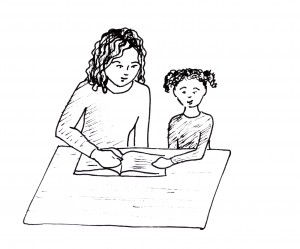How does Germany’s prohibition of homeschooling threaten the civil liberties of American evangelicals? The short answer is: it doesn’t. Nevertheless, conservative groups are warning Americans that their freedom to homeschool is under fire after the Romeikes – a German family seeking asylum in the U.S. in order to home school their children – lost their appeal in federal court in May of last year.
The Romeike family fled to the U.S. in 2008 after suffering legal consequences for homeschooling their five children, including a $17,000 fine and an instance of police forcibly taking their children to school. Under German law homeschooling is illegal but for extraordinary circumstances, for example a child’s physical inability to attend public or private school. Aside from fines, homeschooling can also be punished by jail time and the removal of children from parents’ custody. The German government ensures the right to education for its citizens; in the process it reserves the ability to regulate German education institutions.
The Romeikes are evangelical Christians and desire to keep their children out of a state recognized institutions in order to teach them Christian values. They settled in the Tennessee in 2010 after the Home School Legal Defence Association argued their case and a federal district court judge granted them political asylum. Under American asylum law, political refugee status is granted to those persecuted on the basis of religion, race, nationality, or membership of a ‘particular social group.’ And according to the HSLDA’s attorney Mike Connelly German home schoolers, “are a particular social group.”
To the dismay of the American homeschooling community and civil liberties advocates, the Justice Department concluded differently from the HSLDA. The U.S. government challenged the Tennessee judge’s ruling on the grounds that homeschoolers are not a particular social group and homeschooling is not a fundamental right. According the Department of Justice, because the ban on homeschooling is applied to all members of German society broadly and equally, not a specific grouping of people, persecution that warrants asylum status did not take place. In 2013, the Board of Immigration Appeal overturned the Tennessee judge’s decision. The Romeikes brought their case to the 6th U.S. Circuit Court of Appeals but lost their bid in May of last year.
The threat of the Romeike’s deportation galvanized the American conservative community. An official petition titled “Immediate Action Requested for Romeikes – Grant Permanent Legal Status to Persecuted German Homeschool Family,” was posted on We the People website in March 2013. The petition requests the Romeikes receive “full and permanent legal status.” It received more than 127,000 signatures, surpassing the 100,000 mark which earns an official administration response.
Homeschooling is legal in all fifty states. Many states have adopted homeschooling statutes or other forms of protecting the practice. Additionally, the Supreme Court case Meyer v. Nebraska set a precedent that parents have a right to “establish a home and bring up children,” and to “worship God according to the dictates of his own conscience.”
The principle component of the Department of Justice’s case that has driven the HSLDA and other homeschooling advocates into a frenzy is the Obama administration’s statement that homeschooling is not a fundamental liberty. “This argument necessarily means that the United States government believes that it would not violate your rights if our own government banned homeschooling entirely,” said attorney and HSLDA chairman Michael Farris.
 The likelihood of a national ban on homeschooling is far fetched and the words of Farris seem little more than fear mongering. The conservative Christian community should not feel threatened; there have been no recent threats to the rights of homeschoolers in America and the popularity of the practice as well as Americans’ determined protection of civil liberties would cause a significant political and legal battle if a challenge to homeschooling rights arose at a state level or the national level. Additionally, the U.S. government does not grant political asylum to emigrants from countries whose laws simply don’t aline with U.S. law. Rights guaranteed by the U.S. Constitution are not guaranteed to citizens of the world. Individuals punished under Germany or France’s rigid hate speech laws would not receive political asylum in the United States even though American law provides extensive protection to hate speech (see the most recent SCOTUS case addressing Westboro Baptist Church picketers at a soldier’s funeral in Snyder v. Phelps.) In short, the Obama administration’s tolerance of Germany’s strict homeschooling ban demonstrates respect for Germany’s sovereignty and ability to determine its own society’s expanse of civil liberties, more so than a desire to undermine the American legal foundation to homeschool.
The likelihood of a national ban on homeschooling is far fetched and the words of Farris seem little more than fear mongering. The conservative Christian community should not feel threatened; there have been no recent threats to the rights of homeschoolers in America and the popularity of the practice as well as Americans’ determined protection of civil liberties would cause a significant political and legal battle if a challenge to homeschooling rights arose at a state level or the national level. Additionally, the U.S. government does not grant political asylum to emigrants from countries whose laws simply don’t aline with U.S. law. Rights guaranteed by the U.S. Constitution are not guaranteed to citizens of the world. Individuals punished under Germany or France’s rigid hate speech laws would not receive political asylum in the United States even though American law provides extensive protection to hate speech (see the most recent SCOTUS case addressing Westboro Baptist Church picketers at a soldier’s funeral in Snyder v. Phelps.) In short, the Obama administration’s tolerance of Germany’s strict homeschooling ban demonstrates respect for Germany’s sovereignty and ability to determine its own society’s expanse of civil liberties, more so than a desire to undermine the American legal foundation to homeschool.
The most recent news regarding Romeike v. Holder renewed some hope for the Germany family and for evangelicals in the U.S.. The Supreme Court ordered the Obama administration to respond to the family’s appeal after the government initially waived its right to do so. If the Court agrees to hear the case the HSLDA may yet secure an explicit acknowledgment of the fundamental right to homeschool. “We are pleased by the court’s interest in the issues we have presented in our petition,” Farris commented. “Romeike v. Holder gives the court an opportunity to address important religious freedom and human rights issues. We hope that after due consideration of the government’s brief, they will agree to hear our case.”
